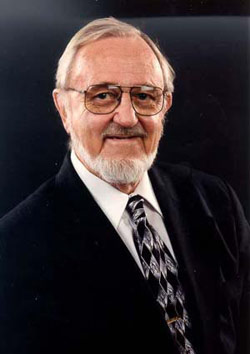 When modern award shows issue a Lifetime Achievement Award, there are always more than a few eyebrows raised at the recipient. After all, most modern entertainers are not old enough to call their professional life complete. In 2005, for example, George Lucas received the AFI Life Achievement Award and then, in 2008, he produced the fourth chapter of his famous Indiana Jones series. Those awards shows should take a lesson from the Materials Research Society as it honored a truly lifelong body of work with its top prize.
When modern award shows issue a Lifetime Achievement Award, there are always more than a few eyebrows raised at the recipient. After all, most modern entertainers are not old enough to call their professional life complete. In 2005, for example, George Lucas received the AFI Life Achievement Award and then, in 2008, he produced the fourth chapter of his famous Indiana Jones series. Those awards shows should take a lesson from the Materials Research Society as it honored a truly lifelong body of work with its top prize.
When Dr. Eric Cross began the research that would become his life’s work, most of his colleagues weren’t even born yet. The Professor Emeritus of Electrical Engineering at Penn State received the Von Hippel award for his groundbreaking research in ferroelectric materials this week. Cross’ research has been applied across many fields including medical ultrasound equipment, computer chips, and lead-free transducers. As a professor at Penn State, he authored or co-authored more than 850 refereed papers and secured 12 patents. He also received the highest faculty award a Penn State professor can receive, becoming an Evan Pugh professor in 1985.
“Understanding work we did helped create a technology that made modern ultrasounds much more sensitive,” Cross says of his study that received the Ben Franklin Medal. “I think we changed the birthrate between male and female in China quite substantially.”
Cross’ work began at sea. When World War II interrupted his study at Leeds University, Cross worked for the British Admiralty on a program using high frequency direction finding to track German U-boats. This research would lead to submarine ultrasound technology that has saved countless lives in naval fleets across the world. The Navy helped Cross continue his work on land, leading to many of his most groundbreaking ferroelectric discoveries. His more recent research has focused on flexoelectric materials which, he believes, are the logical next step for this materials research. At the MRS fall meeting on Dec. 1 in Boston, where Cross will officially receive the award, he plans to speak about the future of flexoelectric materials and what his life’s work has meant to him.
“My probability of seeing the future, of course, is limited as I have just celebrated my 87th birthday, which means I don’t have a tremendously long future to look into personally,” says Cross. “I do believe that we have set the course of activity for a considerable period in these particular materials in this particular topic area, which I continue to find extremely interesting.”
Source: Dr. L. Eric Cross, Penn State University
Writer: John Steele